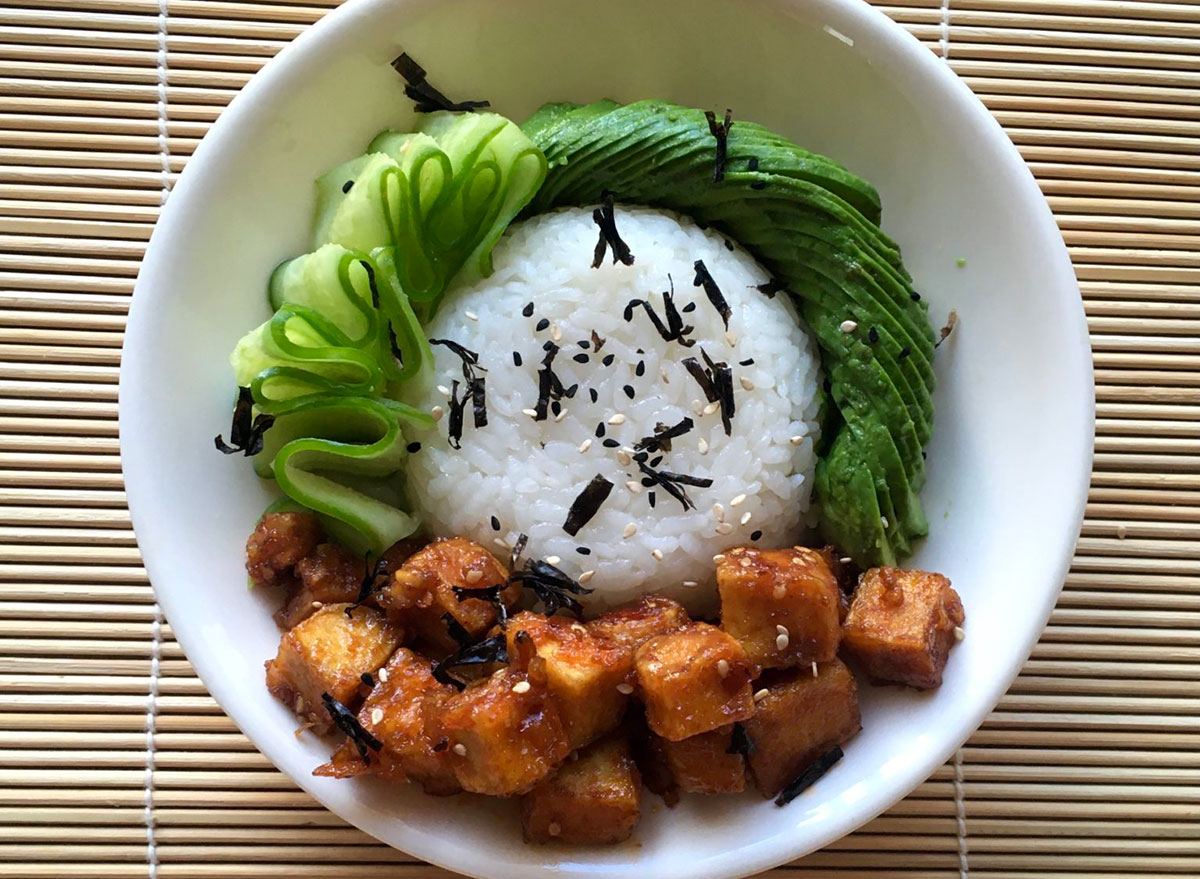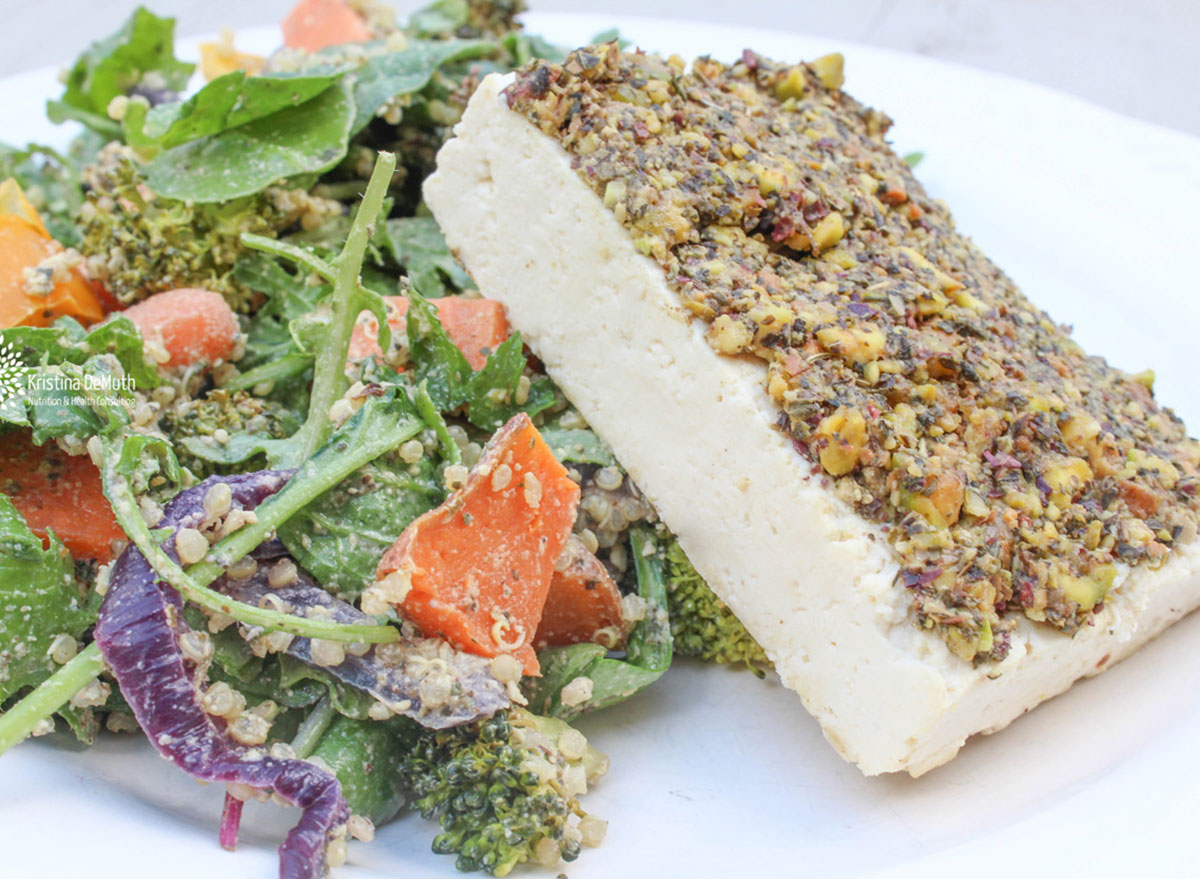Tofu has been around for centuries. In fact, some people say that it can be traced back as early as the 2nd century B.C. This versatile soy product first originated in China and has since then spread across the entire world.
Tofu is made up mostly of soybeans, which are dried and pressed into a block by using coagulants such as calcium sulfate or magnesium chloride. It is packed with nutrients and essential amino acids and is an affordable substitute for meat on days when your budget is a little tighter than usual.
Some consumers have been skeptical about tofu because of its soy content, but research is continually being done to find out the truth about what tofu actually does to our bodies—and the results are surprisingly positive! Read on to learn about the secret effects of eating tofu, and for more healthy eating tips, check out The 7 Healthiest Foods to Eat Right Now.

Soy, which is one of the major ingredients in tofu, contains a chemical compound called isoflavones. These compounds are found in legumes and all soy-based food products and are known to have a lot of health benefits.
A 2018 study in The Journal of Scientific & Technical Research revealed that isoflavones have the ability to help prevent high blood pressure, a serious struggle that can ruin our arteries' elasticity and lead to less blood flow to the heart.
Isoflavones can reduce blood pressure levels by dilating our blood vessels and widening them for easier blood and oxygen flow. It has also been known to raise nitrogen oxide levels in the blood vessels, which helps with blood flow as well.
The study also mentions that isoflavones can help decrease our "bad" LDL cholesterol and increase the "good" HDL cholesterol in our blood.
RELATED: Get even more healthy tips straight to your inbox by signing up for our newsletter!

Soy isoflavones are known as phytoestrogens, which are a kind of plant estrogen that can interact with the estrogen levels in your body. Isoflavones are one of the main reasons why some women have been skeptical about eating soy or tofu, in an attempt to not interfere with their body's natural estrogen levels.
However, research within the past few years has shown that isoflavones may actually have a positive effect on breast cancer mortality in women. A 2017 study of 6,235 women with breast cancer revealed that a diet high in isoflavones actually lowered all-cause mortality by 21%. Although many researchers are still looking into this connection, these findings are good news for tofu lovers and plant-based eaters who may have been wary of soy.
Thinking of going plant-based? Here are the Surprising Effects of Eating Plant-Based Foods, Science Says.

Tofu is a great way to add protein to your diet while keeping fat and carbohydrate content fairly low. In a 3-ounce serving of Whole Foods Organic Tofu, you'll get 9 grams of protein and only 4 grams of fat, 3 grams of sugar, and 15 milligrams of sodium.
Tofu is also a helpful source of protein for those who may be avoiding certain types of meat to improve their heart health. The Harvard School of Public Health found that even small amounts of red meat can increase the risk of cardiovascular disease, so replacing this with a protein source like tofu can help reduce these risks.
Plus, according to Nutrients, soy protein is not only plentiful, but it is a higher quality of protein that is comparable to animal protein and better than many other plant-based sources. It is also one of the more easily digestible proteins.

Soy and tofu are great sources of plant-based iron, especially for people who don't eat meat! For example, there are about 3.28 milligrams of iron in 3 ounces of beef, compared to 3.35 milligrams of iron in a half cup of firm tofu.
Iron is a vital nutrient for our bodies, specifically for things like our liver, muscles, and spleen. If we are iron deficient, we may experience muscle weakness, exhaustion, and cognitive decline, as well as a struggle to fight off infection.
For more healthy tips, read these next:
Secret Effects of Eating Tofu, Says Science | Eat This Not That - Eat This, Not That
Read More

No comments:
Post a Comment